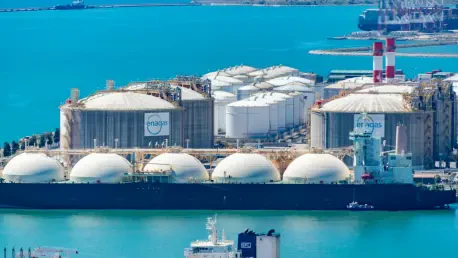The debate over liquefied natural gas (LNG) exports in the U.S. has intensified as energy costs continue to rise, affecting millions of American families and businesses. This roundup explores whether LNG exports are exacerbating these issues by examining diverse perspectives from industry professionals, environmental advocates, and economic analysts. As we delve into the intricate dynamics of this debate, we aim to provide a balanced understanding of how LNG exports are potentially influencing domestic energy prices and environmental risks.
A Historical and Modern Context of Energy Exports
The phenomenon of exporting energy has evolved significantly from its post-World War II inception to today’s globalized energy market. Experts assert that LNG exports have transitioned from a mere economic venture to a strategic component of U.S. energy policy. Industry professionals argue these exports bolster the U.S.’s role as a leading energy provider and strengthen national influence on international markets. Conversely, environmental advocates contend this shift underscores a preference for profit over planetary preservation, as the reliance on fossil fuels persists despite growing cleaner energy options.
Economists point out that while LNG exports have contributed to U.S. economic growth, they have also complicated energy costs domestically. Analysts observe how this dualistic nature of LNG poses critical challenges for policymakers who must navigate the delicate balance between fostering economic benefits and managing ecological responsibilities.
Examining the Economic and Environmental Stakes
Some energy analysts emphasize how LNG, though marketed as a cleaner alternative compared to coal, still poses significant environmental risks due to methane leaks and energy-intensive liquefaction processes. Its environmental impact remains contested within global energy circles. On the economic front, there is a tension between potential revenues from LNG exports and the undesirable rise in domestic energy prices, as observed in several U.S. states where utility bills have surged.
A prominent narrative in this discussion is the push for policy adjustments. Many believe that restructuring the existing framework to favor domestic consumption over international exports could mitigate high energy costs for U.S. consumers while adhering to growing environmental consciousness.
The Influence of Federal Policies and Market Dynamics
Federal policy plays a pivotal role in shaping the LNG export landscape. By facilitating these exports, some argue the government inadvertently creates scarcity within domestic markets, leading to elevated prices that disproportionately affect lower-income households. These policies are often perceived as providing an advantage to corporate stakeholders at the expense of consumers, sparking discussions on energy justice and equity.
Critics advocate for a reexamination of federal policies that currently place international trade above national energy needs. They propose increasing investment in renewable energy infrastructure and removing tariffs on imported clean energy, potentially offsetting the financial burden on consumers while fulfilling environmental commitments.
Practical and Policy Solutions
Looking ahead, the consensus among many environmental and economic analysts is that innovation and policy realignment are essential. Encouraging advancements in renewable energy technologies and expanding infrastructure can offer sustainable alternatives, reducing reliance on LNG. Meanwhile, states are beginning to adopt more aggressive policies to curb emissions and promote local clean energy sources, an approach that could serve as a template for a broader national strategy.
Policymakers are urged to blend economic and ecological priorities, ensuring tariffs on LNG reflect environmental costs, while tariffs on renewable imports are minimized. This strategy could foster an energy economy that is both competitive and sustainable, contributing positively to global climate goals.
Future Considerations and Strategic Actions
Reflecting on the insights gathered, it is clear that LNG exports present complex challenges that require well-considered responses. For stakeholders in the energy sector, fostering collaboration between governmental bodies, industry leaders, and the public is crucial for developing sustainable energy policies.
Policymakers need to prioritize reforms that secure energy affordability for U.S. consumers while embracing environmentally responsible practices. Doing so will empower the U.S. to maintain economic competitiveness without compromising ecological integrity. As this conversation evolves, continued examination and adaptation are vital, enabling all stakeholders to address the pressing energy and environmental challenges of our time.









